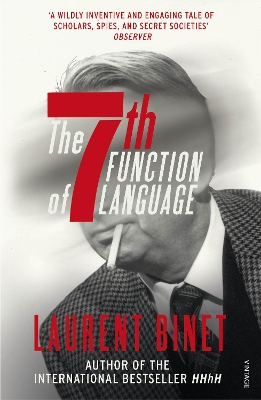Reviewed by Michael @ Knowledge Lost on
The way this novel works famous literary theorists like Roland Barthes, Jacques Derrida, Umberto Eco, Gilles Deleuze, Michel Foucault, Judith Butler, and Julia Kristeva into the plot is entertainingly comical without detracting from the importance of these people. The novel essentially needs to give a brief introduction to everyone and their theories and does so by deploying a detective unfamiliar with their world that requires explanations. Which allowed me to grasp a little more about people like Derrida and Foucault. It also made me want to pull out my copy of A Lover’s Discourse.
“As Umberto Eco might say: for communicating, language is perfect; there could be nothing better. And yet, language doesn’t say everything. The body speaks, objects speak, history speaks, individual or collective destinies speak, life and death speak to us constantly in a thousand different ways. Man is an interpreting machine and, with a little imagination, he sees signs everywhere”
When this was longlisted for the Man Booker International Prize, I saw a few people calling this novel pretentious, while others were comparing it to Dan Brown. A contradiction that never seemed to sit right with me. I never found it to be either, I would prefer to compare the novel with something like Foucault’s Pendulum by Umberto Eco, which is a novel about three members of the press that decided to make up their own conspiracy theories. This allowed Eco to teach the reader about secret societies and conspiracies all within the plot. Laurent Binet takes a similar approach in exploring literary theories within the confines of the plot without it feeling like non-fiction or making the novel clunky.
This is a perfect blend of a satirical novel and a thriller. These are the types of books I love, I learn something while reading a fast paced crime novel. I normally pick up a crime novel as palette cleanser but if it is able to teach me something, I love them more. This is why I enjoy the writing of Umberto Eco and now I think Laurent Binet will make this list, once I read HHhH. I wish this was available as an audiobook because I think it would work really well in that medium. This never felt like a hard read, there was plenty of comedic moments and the literary references scattered throughout were a pure delight to discover.
“Eco listens with interest to the story of a lost manuscript for which people are being killed. He sees a man walk past holding a bouquet of roses. His mind wanders for a second, and a vision of a poisoned monk flashes through it.”
If you are a fan of literary theory or philosophy, then this is the book for you. This is a new favourite and next time I read this, I will have to read A Lover’s Discourse simultaneously. I am the kind of person that is slowly trying to read through The Norton Anthology of Theory and Criticism, so this quickly became a new favourite. It is hard to be critical about a novel that I enjoyed so much, I loved this book, but I understand it is not for everyone.
This review originally appeared on my blog; http://www.knowledgelost.org/book-reviews/genre/literary-fiction/the-7th-function-of-language-by-laurent-binet/
Reading updates
- Started reading
- 14 April, 2018: Finished reading
- 14 April, 2018: Reviewed
